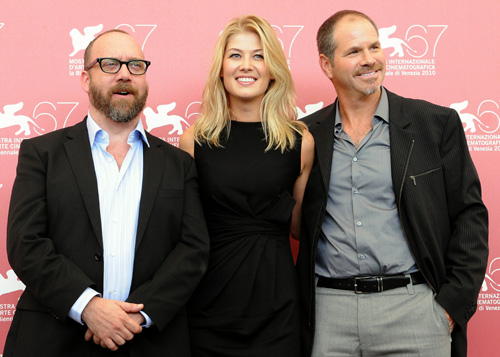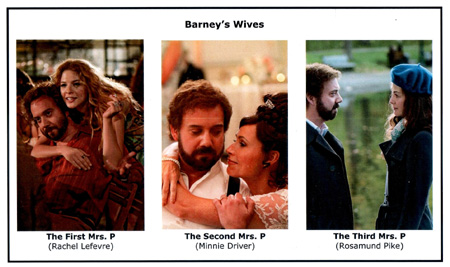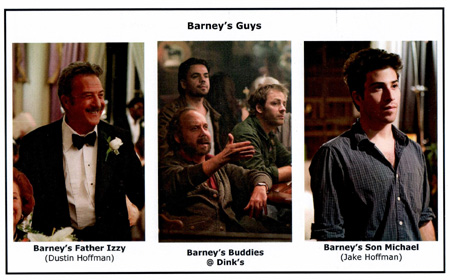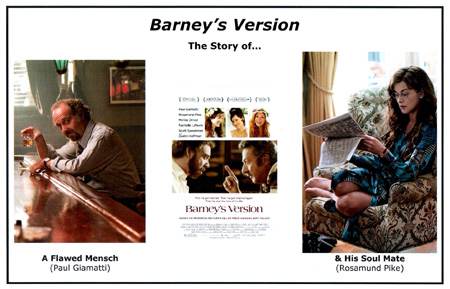Jan Chats with Richard Lewis
about BARNEY’S VERSION
(his new adaption of
Mordechi Richler’s final novel)

Director Richard J. Lewis (right) with BARNEY’S VERSION stars Paul Giamatti (“Barney”)
& Rosamund Pike (“Miriam”) at the 67th annual Venice Film Festival (9/10/10).
Photo Credit: Alberto Pizzoli/AFP/Getty Images/NewsCom
Jan Lisa Huttner: Okay, Richard, I want to start by getting the 800-pound gorilla off the table: You’ve turned Mordechi Richler’s character “Miriam Greenberg” into “Miriam Grant,” so is Barney Panofsky’s third wife Miriam still Jewish in your film?
Richard J.
Lewis: I didn't want to make the film too parochial. Love comes in all shapes and sizes, so I didn't want this idea that Barney was just chasing Jewish girls…
Jan: Okay, but you don't ever say anywhere that Miriam is
not Jewish, do you?
Richard: That's right.
Jan: Barney’s first wife, Clara, tells Barney she’s a shiksa. She even makes jokes about it, right?
Richard: Right, but she is Jewish. She's the daughter of a cantor.
Jan: So Clara
is messing with Barney’s head! Now Rosamund Pike, the actress who plays Miriam, is usually very blonde (e.g., as “Helen” in
AN EDUCATION), but you give her long brown hair. So you're equivocating, right?
Richard: Well I don't know if I was equivocating... I felt like that choice had to do with grounding Miriam, making her a more earthy character… And actually there
is some equivocation because I didn't really want Barney running after, like, “a blonde bombshell.” Miriam isn’t “the monkey woman” Karen Black played in
PORTNOY’S COMPLAINT.
Jan: I'll tell you why this matters to me so much, Richard. As a Jewish woman, I’m watching
BARNEY’S VERSION, and I have to be honest, the first half is making me a bit nervous. Barney’s second wife doesn’t even get a name! Richler just calls her “The Second Mrs. P,” and when you introduce her in the film, actress Minnie Driver plays her very broadly as a “Jewish American Princess” (a JAP).
Then the light went on! Here they are, the three female archetypes of Barney’s era: the artsy Jewish woman (Clara), the “Daddy’s Girl JAP” (The Second Mrs. P), and the intellectual Jewish woman (Miriam).

But women’s roles were changing at the very moment Barney entered his manhood, and many Jewish women (women just like Miriam Greenberg) were
on the front lines of this historical revolution. Isn’t that one reason why Barney, like many Jewish men of his generation, finds he has “a woman problem”?
Richard: Well, I will allow you that interpretation. I like it, but it's up to you to make that interpretation. And I think that's great, because we did go out of our way not to make Miriam “not Jewish.”
Jan: Exactly! Miriam can’t be explicitly “not Jewish,” because she’s the wife who comes after “The Second Mrs. P,” a character who starts as a stereotype, but actually has tremendous heart.
Richard: Often I found the greatest “Jewish American Princesses” that I knew were so bright and so stupid at the same time. And it was wonderful to see that combination, and that kind of emotional immaturity, where that “Daddy's Girl” kicks in. Minnie Driver brought so much hurt and damage to the character of “The Second Mrs. P.”
Jan: Right! So, OK, new question: What is “a mensch”?
Richard: A mensch, to me, is a person with integrity, a person who has goodness at his heart, a person who gives more than he takes. A mensch is essentially true to himself—consistent, good, giving, that's a mensch.
Mordecai Richler was mensch, but Barney? I'm not so sure Barney is a mensch…
Barney behaves in certain ways that are mensch-like occasionally, but I'm not sure that he's ultimately a mensch because I think he's too selfish to be a mensch. He doesn't have the sort of
inner integrity, ultimately, that might allow that to happen.
Jan: OK, I see that Barney’s not perfect, but still?
Richard: What happens in Richler’s book is that Barney says: "I was looking for the monster and the monster was me." You read that in the book, and I think that's a brave admission and a mensch-like admission.
Does Barney get that in the film? I don't know, does he? Does he get that sentiment? Does he understand what he did?
Jan: Yes, Richard, your Barney is certainly flawed, but he never stops trying.
Richard: Then maybe you're right. Then maybe you're right.
Jan: Yes, Richard, you've taken a huge novel and you've condensing it down to a standard 2 hour runtime, but I think your choices were all brilliant.
For example, there are lots of male voices in the novel (Hymie, Uncle Irv, etc, etc), but you’ve put most of their dialogue into the mouth of Dustin Hoffman who’s so terrific here as Barney’s father “Izzy.” So in the film version of Barney’s life, Izzy now represents all the men who gave birth to Barney—all the voices of the last generation of men.
So is Barney a mensch? Well for sure he's not perfect, but Barney is another step along the evolutionary chain—one step beyond Izzy and the men of Izzy’s generation, and definitely way ahead of both of his first two fathers-in-law!
Richard: You’ve asked a very provocative question and a good one, Jan: What is a mensch? And that has to do with how to negotiate the terrain of your life. How do you negotiate that terrain while living inside contradictions and various aspects that are both good and bad in yourself, actions that can be deemed noble and hateful, choices that you make that are both black and white, gray, whatever…
In modern cinema you have characters that are based on one or two things that are very two-dimensionally defined. But Barney is a man whose—the full scope of his life is essentially unveiled for the audience with all its warps. A man to me is a combination of so many different things. You're not fixed. Your identity (as who you are) is not fixed until that tombstone at the end. That's when you get to be who you are. Up to that point, you're just trying as hard as you can.
And so the question: What makes a mensch? Well, I guess it’s doing your best.
Jan: Jewish men like Barney were raised with the assumption that they could have wives like their fathers had, but the world changed underneath them…
Richard: Isn't that Barney's tragic flaw? Isn't that what ends up biting him in the ass?
Jan: Yes, but it's also an accident of birth. Izzy just wants to be “one of the guys,” but Barney wants a wife who’s also an intellectual companion/soul mate.

Richard: That's right, but he’s still stuck in some of the old patterns. Sure, I totally agree.
Jan: OK, one last question before they throw me out. You grew up in Montreal, then you came here to Northwestern for college, and now you live in LA. What’s unique about “Jewish Montreal” for you?
Richard: Have you ever had this phenomenon when you go to a synagogue and you're sitting in the synagogue and you look over to your right and you go: “That person looks exactly like that person, and that person looks exactly like that person, and there's the person I knew from high school.” It's a really interesting phenomenon.
Jan: I call it “Greater Ashkenaziland.”
Richard: Sure. So my feeling is that Montreal Jewish culture is not that different from Chicago Jewish culture—a JAP and a “Jewish Canadian Princess,” not that different. There are “Urban Jewish Princesses” that exist in both places.
Of course the more you find yourself in deeper waters…
The French provide a fairly full on cultural experience in Quebec, so your Montreal Jews have come to a place where there's already a very deep culture. So you have to make your imprint. You have to be a little more forward. The Montreal Jews are much more forward than the Toronto Jews. Montreal Jews feel more like New York Jews than Chicago Jews. They're just a little pushier, more full of chutzpah.
It's quite a fine line, balancing assimilation with maintaining your identity, and I think Jews have done it pretty deftly through the ages.
© Jan Lisa Huttner (1/20/11)—SPECIAL FOR FILMS FOR TWO®

All Photos from BARNEY’S VERSION © Sabrina Lantos
Courtesy of Sony Pictures Classics
Editor’s Note: This face-to-face interview was conducted at the Peninsula Hotel in Chicago on January 19, 2011. The conversation was transcribed by Dana Sinn, then condensed and edit for publication by me. Huge thanks to Kathleen Sewall of Allied Integrated Marketing for making all the arrangements!
Personal Addendum: This post is dedicated to Bart Neuman. One day in 1986, I called Bart in a state of great turmoil. He was on vacation at the time, and literally perched on his mother’s roof when I called, but his incredible wife Judy handed him the phone anyway. After listening to my tale of woe for a minute or two, Bart said this to me: “Jan, I think you’re old enough now to understand the world is filled with shades of gray.” Indeed!
No doubt about it: Bart Neuman is a mensch
J
